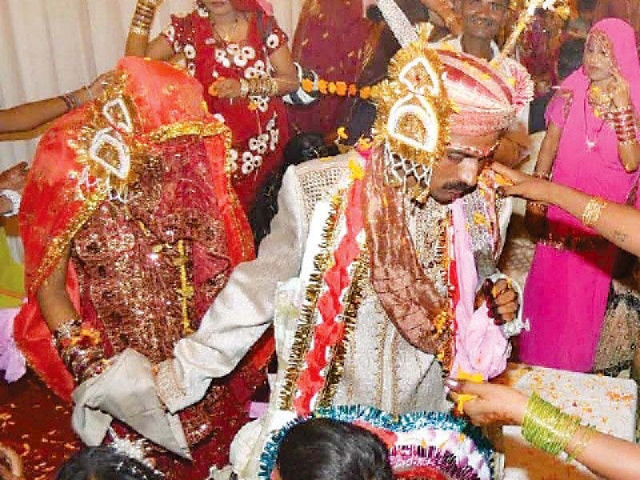Painstaking wait for Hindu couples continues
Law mandating registration of marriages of the religious minority yet to be implemented

Despite the state endeavouring to integrate minority groups into society, the inability of the system to register Hindu marriages, has pushed the nation back to square one.
The Sindh Hindu Marriage Act was passed in 2016 and sought to bestow Hindu marriage solemnisers, also referred to as pandits, with the authority to conduct marriage ceremonies as per the Vedic tradition and later register them with the local union council. However, 7 years later, Hindu couples across Sindh still remain deprived of a formal acknowledgment of their union, as the law continues to await implementation.
Hence, what was initially seen as a milestone towards achieving inclusivity for the religious minority, has gradually become a source of agitation. Furthermore, the lack of implementation means that offspring of the unregistered Hindu couples can neither obtain a CNIC nor a passport.
In this regard, Ross Mahtani, a minority rights activist at the forefront of the movement, which culminated in the passage of the Act, expressed his displeasure at the absence of the implementation of the law “The legislation in itself means nothing to us, until or unless it is diligently put into effect,” protested Mahtani.
Mahtani went on to call out the government for delaying the implementation of the law for 7 years now “when it was supposed to be only a matter of months.”
“Within three months of passage of the law, the government had to finalise the rules and register pandits in every district. But clearly that has not been the case,” he regretted, while speaking to the Express Tribune.
While some like Mahtani lambaste the government’s inaction for the delay in advancement of minority rights, others argue that a lack of implementation plagues all spheres of policymaking, not just those pertaining to the minorities.
As Nand Kumar Goklani, a member of the Provincial Assembly of Sindh and the Grand Democratic Alliance (GDA) noted, “every bill passed by the provincial assembly says that the government will start a massive campaign to educate the masses and implement the law but this rarely happens. Laws are just pieces of paper if the government does not implement them in the true sense.”
While the delay in implementation of the 2016 Act certainly dampens the level of trust citizens place in the system, it also jeopardises to a much larger extent, the wellbeing of divorced or widowed women and their children, who are deprived of the provisions for their welfare guaranteed by the Act. For instance, under the Act, widowed women were to be allowed to officially remarry after six months of their husband’s death, whereas divorced women were entitled to alimony and maintenance for their children, in case they were financially unstable.
When quizzed about the incumbent government’s disregard for Hindu families, Mukesh Kumar Chawla, the Minister for Parliamentary Affairs, reassured that this was not the case. “We have now initiated the registration phase for pandits in the province and Hindu citizens will be able to obtain marriage, birth, and death certificates from their nearest union council,” informed Chawla while talking to The Express Tribune.
Published in The Express Tribune, April 25th, 2023.



















COMMENTS
Comments are moderated and generally will be posted if they are on-topic and not abusive.
For more information, please see our Comments FAQ